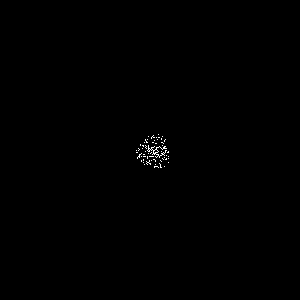布莱恩大脑
此词条暂由彩云小译翻译,未经人工整理和审校,带来阅读不便,请见谅。
Brian's Brain is a cellular automaton devised by Brian Silverman, which is very similar to his Seeds rule.
Brian's Brain is a cellular automaton devised by Brian Silverman, which is very similar to his Seeds rule.
布莱恩的大脑是由布莱恩 · 西尔弗曼设计的细胞自动机,这与他的种子规则非常相似。
Rules
Brian's Brain consists of an infinite two-dimensional grid of cells, but unlike Seeds, each cell may be in one of three states: on, dying, or off. Each cell is considered to have eight neighbors (the Moore neighborhood), as in Seeds and Conway's Game of Life.
Brian's Brain consists of an infinite two-dimensional grid of cells, but unlike Seeds, each cell may be in one of three states: on, dying, or off. Each cell is considered to have eight neighbors (the Moore neighborhood), as in Seeds and Conway's Game of Life.
布莱恩的大脑由一个无限的二维细胞网格组成,但与种子不同,每个细胞可能处于三种状态之一: 开、死、关。每个细胞被认为有八个邻居(摩尔社区) ,如在种子和康威的生活游戏。
In each time step, a cell turns on if it was off but had exactly two neighbors that were on, just like the birth rule for Seeds. All cells that were "on" go into the "dying" state, which is not counted as an "on" cell in the neighbor count, and prevents any cell from being born there. Cells that were in the dying state go into the off state.
In each time step, a cell turns on if it was off but had exactly two neighbors that were on, just like the birth rule for Seeds. All cells that were "on" go into the "dying" state, which is not counted as an "on" cell in the neighbor count, and prevents any cell from being born there. Cells that were in the dying state go into the off state.
在每个时间步骤中,一个细胞如果关闭就会打开,但是只有两个相邻的细胞打开,就像 Seeds 的出生规则一样。所有处于“打开”状态的细胞都进入“死亡”状态,这种状态在相邻细胞计数中不被算作“打开”细胞,并阻止任何细胞在那里出生。处于死亡状态的细胞进入关闭状态。
Behavior
Because of the cellular automaton's name, some websites compare the automaton to a brain and each of its cells to a neuron, which can be in three different states: ready (off), firing (on), and refractory (dying).[1]引用错误:没有找到与</ref>对应的<ref>标签
|date=2001-09-15|work=Mirek's Cellebration documentation|accessdate=2009-05-17}}</ref>
| date 2001-09-15 | work Mirek’s Cellebration documentation | accessdate 2009-05-17} / ref

oscillator in Brian's Brain.]]
布莱恩大脑中的振荡器]]
The "dying state" cells tend to lead to directional movement, so almost every pattern in Brian's Brain is a spaceship. Many spaceships are rakes, which emit other spaceships. Another result is that many Brian's Brain patterns will explode messily and chaotically, and often will result in or contain great diagonal waves of on and dying cells. For example, a 2×2 block of on cells will result in an ever-expanding diamond consisting of four diagonal waves that move across the plane at the pattern's speed of light.
The "dying state" cells tend to lead to directional movement, so almost every pattern in Brian's Brain is a spaceship. Many spaceships are rakes, which emit other spaceships. Another result is that many Brian's Brain patterns will explode messily and chaotically, and often will result in or contain great diagonal waves of on and dying cells. For example, a 2×2 block of on cells will result in an ever-expanding diamond consisting of four diagonal waves that move across the plane at the pattern's speed of light.
“死亡状态”细胞倾向于导致定向运动,所以几乎布莱恩大脑中的每个模式都是一艘宇宙飞船。许多宇宙飞船是耙子,它们发射出其他宇宙飞船。另一个结果是,许多布莱恩的大脑模式将爆炸的混乱和混乱,往往会导致或包含大量对角线波上和死亡的细胞。例如,一个22块的单元将产生一个不断膨胀的钻石,其中包括四个对角线波,它们以光速穿过平面。
Nevertheless, oscillators have been constructed in Brian's Brain. An example has just four on cells and four dying cells, and oscillates with period 3.[2]
Nevertheless, oscillators have been constructed in Brian's Brain. An example has just four on cells and four dying cells, and oscillates with period 3.
然而,在布赖恩的大脑中已经构建了振荡器。一个例子只有四个细胞和四个死亡细胞,周期3振荡。
References
- Resnick, Mitchel 第一个米切尔; Silverman, Brian
2 Silverman,Brian (1996-02-04
日期1996-02-04). "Exploring Emergence: The Brain Rules 探索涌现: 大脑规则". MIT Media Laboratory, Lifelong Kindergarten Group
麻省理工学院媒体实验室,终身幼儿园小组. Archived from [http://llk.media.mit.edu/projects/emergence/mutants.html
Http://llk.media.mit.edu/projects/emergence/mutants.html the original] on 2008-12-23
2008年12月23日. Retrieved 2008-12-15
2008-12-15. {{cite web}}: Check |url= value (help); Check date values in: |accessdate=, |date=, and |archivedate= (help); Invalid |url-status=dead
状态死机 (help); Text "archiveurl https://web.archive.org/web/20081223050254/http://llk.media.mit.edu/projects/emergence/mutants.html" ignored (help); Text "authorlink Mitchel Resnick" ignored (help); Text "last Resnick" ignored (help); line feed character in |accessdate= at position 11 (help); line feed character in |archivedate= at position 11 (help); line feed character in |author2= at position 17 (help); line feed character in |date= at position 11 (help); line feed character in |first= at position 8 (help); line feed character in |publisher= at position 50 (help); line feed character in |title= at position 37 (help); line feed character in |url-status= at position 5 (help); line feed character in |url= at position 57 (help)
}}
}}
- ↑ Evans, M. Steven (2002-01-28). "Cellular Automata - Brian's Brain". Retrieved 2009-05-17.
- ↑ "Archived copy". Archived from the original on 2011-07-23. Retrieved 2009-05-17.
{{cite web}}: CS1 maint: archived copy as title (link)
Category:Cellular automaton rules
分类: 细胞自动机规则
This page was moved from wikipedia:en:Brian's Brain. Its edit history can be viewed at 布莱恩大脑/edithistory
